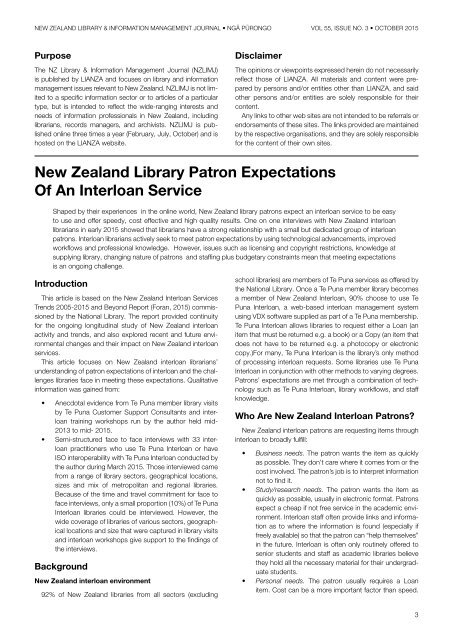THE NEW ZEALAND LIBRARY & INFORMATION MANAGEMENT JOURNAL NGĀ PŪRONGO
NZLIMJ%20Vol%2055%20Issue%203
NZLIMJ%20Vol%2055%20Issue%203
You also want an ePaper? Increase the reach of your titles
YUMPU automatically turns print PDFs into web optimized ePapers that Google loves.
<strong>NEW</strong> <strong>ZEALAND</strong> <strong>LIBRARY</strong> & <strong>INFORMATION</strong> <strong>MANAGEMENT</strong> <strong>JOURNAL</strong> • <strong>NGĀ</strong> <strong>PŪRONGO</strong> VOL 55, ISSUE NO. 3 • OCTOBER 2015<br />
Purpose<br />
The NZ Library & Information Management Journal (NZLIMJ)<br />
is published by LIANZA and focuses on library and information<br />
management issues relevant to New Zealand. NZLIMJ is not limited<br />
to a specific information sector or to articles of a particular<br />
type, but is intended to reflect the wide-ranging interests and<br />
needs of information professionals in New Zealand, including<br />
librarians, records managers, and archivists. NZLIMJ is published<br />
online three times a year (February, July, October) and is<br />
hosted on the LIANZA website.<br />
Disclaimer<br />
The opinions or viewpoints expressed herein do not necessarily<br />
reflect those of LIANZA. All materials and content were prepared<br />
by persons and/or entities other than LIANZA, and said<br />
other persons and/or entities are solely responsible for their<br />
content.<br />
Any links to other web sites are not intended to be referrals or<br />
endorsements of these sites. The links provided are maintained<br />
by the respective organisations, and they are solely responsible<br />
for the content of their own sites.<br />
New Zealand Library Patron Expectations<br />
Of An Interloan Service<br />
Shaped by their experiences in the online world, New Zealand library patrons expect an interloan service to be easy<br />
to use and offer speedy, cost effective and high quality results. One on one interviews with New Zealand interloan<br />
librarians in early 2015 showed that librarians have a strong relationship with a small but dedicated group of interloan<br />
patrons. Interloan librarians actively seek to meet patron expectations by using technological advancements, improved<br />
workflows and professional knowledge. However, issues such as licensing and copyright restrictions, knowledge at<br />
supplying library, changing nature of patrons and staffing plus budgetary constraints mean that meeting expectations<br />
is an ongoing challenge.<br />
Introduction<br />
This article is based on the New Zealand Interloan Services<br />
Trends 2005-2015 and Beyond Report (Foran, 2015) commissioned<br />
by the National Library. The report provided continuity<br />
for the ongoing longitudinal study of New Zealand interloan<br />
activity and trends, and also explored recent and future environmental<br />
changes and their impact on New Zealand interloan<br />
services.<br />
This article focuses on New Zealand interloan librarians’<br />
understanding of patron expectations of interloan and the challenges<br />
libraries face in meeting these expectations. Qualitative<br />
information was gained from:<br />
• Anecdotal evidence from Te Puna member library visits<br />
by Te Puna Customer Support Consultants and interloan<br />
training workshops run by the author held mid-<br />
2013 to mid- 2015.<br />
• Semi-structured face to face interviews with 33 interloan<br />
practitioners who use Te Puna Interloan or have<br />
ISO interoperability with Te Puna Interloan conducted by<br />
the author during March 2015. Those interviewed came<br />
from a range of library sectors, geographical locations,<br />
sizes and mix of metropolitan and regional libraries.<br />
Because of the time and travel commitment for face to<br />
face interviews, only a small proportion (10%) of Te Puna<br />
Interloan libraries could be interviewed. However, the<br />
wide coverage of libraries of various sectors, geographical<br />
locations and size that were captured in library visits<br />
and interloan workshops give support to the findings of<br />
the interviews.<br />
Background<br />
New Zealand interloan environment<br />
92% of New Zealand libraries from all sectors (excluding<br />
school libraries) are members of Te Puna services as offered by<br />
the National Library. Once a Te Puna member library becomes<br />
a member of New Zealand Interloan, 90% choose to use Te<br />
Puna Interloan, a web-based interloan management system<br />
using VDX software supplied as part of a Te Puna membership.<br />
Te Puna Interloan allows libraries to request either a Loan (an<br />
item that must be returned e.g. a book) or a Copy (an item that<br />
does not have to be returned e.g. a photocopy or electronic<br />
copy.)For many, Te Puna Interloan is the library’s only method<br />
of processing interloan requests. Some libraries use Te Puna<br />
Interloan in conjunction with other methods to varying degrees.<br />
Patrons’ expectations are met through a combination of technology<br />
such as Te Puna Interloan, library workflows, and staff<br />
knowledge.<br />
Who Are New Zealand Interloan Patrons?<br />
New Zealand interloan patrons are requesting items through<br />
interloan to broadly fulfill:<br />
• Business needs. The patron wants the item as quickly<br />
as possible. They don’t care where it comes from or the<br />
cost involved. The patron’s job is to interpret information<br />
not to find it.<br />
• Study/research needs. The patron wants the item as<br />
quickly as possible, usually in electronic format. Patrons<br />
expect a cheap if not free service in the academic environment.<br />
Interloan staff often provide links and information<br />
as to where the information is found (especially if<br />
freely available) so that the patron can “help themselves”<br />
in the future. Interloan is often only routinely offered to<br />
senior students and staff as academic libraries believe<br />
they hold all the necessary material for their undergraduate<br />
students.<br />
• Personal needs. The patron usually requires a Loan<br />
item. Cost can be a more important factor than speed.<br />
3


